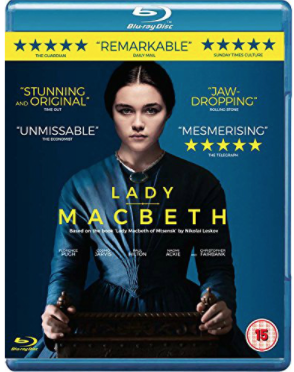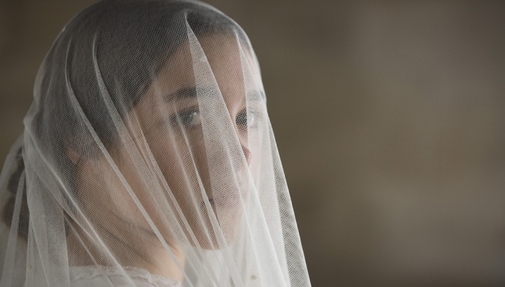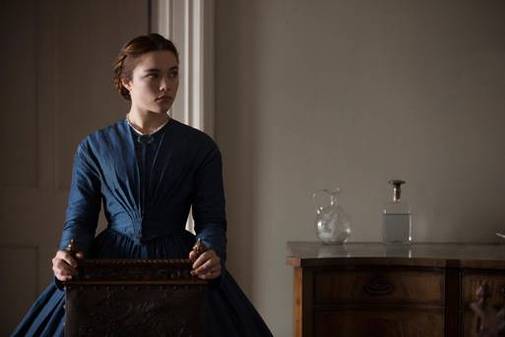By Spencer Coile
 Even at a quickly-paced 89 minutes, Lady Macbeth is unafraid to work slowly and dilligently. Based on Lady Macbeth of the Mtsensk District by Nikolai Reskov and directed by William Oldroyd, this is a meticulously made tale of sexual repression and desire. It follow Katherine (Florence Pugh), a young woman married off to a man twice her age. Caught in a loveless, sexless marriage, she plots a better life for herself and then ensures, by any means necessary, to achieve her goal.
Even at a quickly-paced 89 minutes, Lady Macbeth is unafraid to work slowly and dilligently. Based on Lady Macbeth of the Mtsensk District by Nikolai Reskov and directed by William Oldroyd, this is a meticulously made tale of sexual repression and desire. It follow Katherine (Florence Pugh), a young woman married off to a man twice her age. Caught in a loveless, sexless marriage, she plots a better life for herself and then ensures, by any means necessary, to achieve her goal.
The film (out now on DVD) is a dizzying narrative of deceit and treachery. Despite taking place in a stuffy 19th century English household, its twisted web of sex, love, and murder smolders. I would be lying if I said I didn't find myself screaming "Ohmygod!" over and over again throughout the film. Lady Macbeth evolves into something far messier, more suspenseful, and ever more intriguing than what first meets the eye...
Lady Macbeth opens with Katherine immediately being married off to Alexander Lester (Paul Hilton), a rich nobleman. She dons a veil and joylessly sings along to the hymn that will unite them together in holy matrimony. She joins in the singing only sporadically, looking out the corner of her eye for anything else that might keep her attention. Though Katherine's age is never disclosed, the age gap between the bride and groom is abundantly clear. Already she is bored, restless, and fed up with domesticated life. Making matters worse, Alexander makes no effort to have a sexual relationship with his wife, preferring instead to have her strip down to nothing and merely look at her. She is a kept woman -- kept only to be looked at. Even her wish to go outside and take in the fresh air is halted by her husband's demands to stay inside.
All of this changes when her husband is away on business and Katherine meets Sebastian (Cosmo Jarvis), one of the men who works around the house. The film offers little context into their relationship aside from their physical attraction to one another and the two begin an illicit affair. No longer bored with her hum-drum life, Katherine is now powerful, exploring her sexuality and scheming for a life better than what she once had.
To give anything else away would be doing the film a great disservice. Director William Oldroyd plays with the power dynamics between men and women in such a unique way (especially for the time period), that Lady Macbeth transcends its 19th century setting. What could have easily been a low-key, slow burning drama eventually spirals into a study of madness and lust. To what lengths will Katherine go in order to be with the one she loves? Or, for that matter, does she even love Sebastian to begin with? Or does she simply love defying the patriarchal power structures that limited her possibility for happiness in the first place?
Oldroyd does not concern himself with finding easy answers. In fact, many questions are left unanswered when the credits start to roll. And that is what makes Lady Macbeth so captivating.
It is also helped immensely by Florence Pugh's staggering work. Each steady shot in the film captures her face -- icy, defiant, and arrogant. Although she is young, her voice is raspy and strangely mature, a counterpoint to her impulsive and childish acts. This, matched with her maniacal giggling and oddly contemporary line readings, helps to turn Katherine into a volcanic character. Lady Macbeth is sometimes visually shrouded in shadows, Pugh offers no more light, unafraid to reveal the darkest qualities of this woman. She is bratty and selfish -- almost to a point where we cannot help but laugh uncomfortably. Her viciousness (however understated) is damn near frightening.
Lady Macbeth is a slow-burn, certainly, but not slow-paced. The deeper into the web we get, the more thought-provoking and compelling the character becomes with her chilling expressions and off-the-cuff remarks. Oldroyd and Pugh have crafted a true enigma; one we can never quite look away from.
Grade: A-/B+

